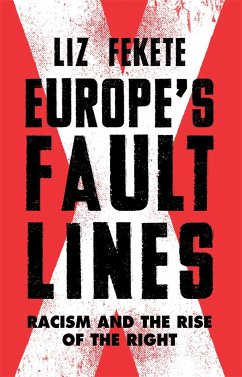It is clear that the right is on the rise, but after Brexit, the election of Donald Trump and the spike in popularity of extreme-right parties across Europe, the question on everyone's minds is: how did this happen?
An expansive investigation of the ways in which a newly-configured right interconnects with anti-democratic and illiberal forces at the level of the state, Europe's Fault Lines provides much-needed answers, revealing some uncomfortable truths.
What appear to be "blind spots" about far-right extremism on the part of the state, are shown to constitute collusion-as police, intelligence agencies and the military embark on practices of covert policing that bring them into direct or indirect contact with the far right, in ways that bring to mind the darkest days of Europe's authoritarian past.
Old racisms may be structured deep in European thought, but they have been revitalized and spun in new ways: the war on terror, the cultural revolution from the right, and the migration-linked demonization of the destitute "scrounger." Drawing on her work for the Institute of Race Relations over thirty years, Liz Fekete exposes the fundamental fault lines of racism and authoritarianism in contemporary Europe.
An expansive investigation of the ways in which a newly-configured right interconnects with anti-democratic and illiberal forces at the level of the state, Europe's Fault Lines provides much-needed answers, revealing some uncomfortable truths.
What appear to be "blind spots" about far-right extremism on the part of the state, are shown to constitute collusion-as police, intelligence agencies and the military embark on practices of covert policing that bring them into direct or indirect contact with the far right, in ways that bring to mind the darkest days of Europe's authoritarian past.
Old racisms may be structured deep in European thought, but they have been revitalized and spun in new ways: the war on terror, the cultural revolution from the right, and the migration-linked demonization of the destitute "scrounger." Drawing on her work for the Institute of Race Relations over thirty years, Liz Fekete exposes the fundamental fault lines of racism and authoritarianism in contemporary Europe.
For the twenty-five years I have known Liz Fekete she has been a tireless anti-racist and anti-fascist fighter, as well as a people's intellectual and a political inspiration. Fekete brings that cumulative experience, insight and commitment to her brilliant new book, Europe's Fault Lines, which maps the shifting terrain of racism and right wing populism in Europe, as well as continued forms of resistance. This book not only paints a gut-wrenching portrait of the vulgarity and violence of Neoliberalism, but through her clarity of analysis, Fekete gives us sustenance for the struggles that lay ahead. Barbara Ransby, author of Eslanda: The Large and Unconventional Life of Mrs Paul Robeson








